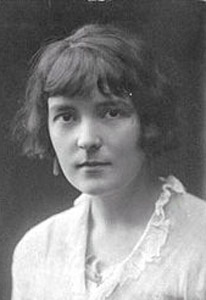
('That Summertime in Paris' © Bastiaan_65, 2012)
*
KATHERINE MANSFIELD – A CRUEL TALENT?
by DAVID BUTLER
*
In any history of the short story in English, the place of the New Zealand author Katherine Mansfield (1888-1923) is assured. That said, four stories in particular have been so universally anthologised that there is a danger of their being taken as entirely representative of her art. These four are ‘Prelude’, ‘The Garden Party’, ‘The Daughters of the Late Colonel’, and ‘Bliss’. They are in many ways ‘safe’ stories, consummately crafted to be sure; a keen receptivity is at work, the debt to Chekhov is apparent. However, I would argue that Mansfield’s aesthetic is frequently more disquieting, even cruel – in the sense that her acquaintance D. H. Lawrence called Dostoevsky’s talent cruel.
Like so many early Modernists, Mansfield had an outsider’s sensibility in a number of important senses. In common with Eliot, Pound and Joyce she was an émigrée drawn to, and excited by the possibilities and clamour of the Metropolis. In common with Wilde, Woolf and Gide, her sexual orientation(s) were viewed by society as dangerous – her mother brought her to a Bavarian spa in an attempt to cure her of her lesbian proclivities! And, in common with Kafka and Chekhov, the tubercular condition which gave her such unique and particular insights also led to a tragically early death.
 Like many Modernists – from Yeats to Pessoa – Mansfield was fascinated by the mask and the masque. There are numerous extant photos, and contemporary commentaries, which show Mansfield’s love of costume, of disguise, of pose, of play. Like the unfortunate Ada Moss of her vignette ‘Pictures’, she worked on-and-off as a film-extra. She was also a consummate, and much-feared mimic. This characteristic extends to her frequent adoption of playful pseudonyms – there are stories published under such ‘cross-dressing’ names as Boris Petrovsky and Julian Mark – indeed, Mansfield was her grandmother’s surname; she was born Katherine Beauchamp. As an extension of this cross-dressing, I’d like to consider two of her stories presented from a male perspective.
Like many Modernists – from Yeats to Pessoa – Mansfield was fascinated by the mask and the masque. There are numerous extant photos, and contemporary commentaries, which show Mansfield’s love of costume, of disguise, of pose, of play. Like the unfortunate Ada Moss of her vignette ‘Pictures’, she worked on-and-off as a film-extra. She was also a consummate, and much-feared mimic. This characteristic extends to her frequent adoption of playful pseudonyms – there are stories published under such ‘cross-dressing’ names as Boris Petrovsky and Julian Mark – indeed, Mansfield was her grandmother’s surname; she was born Katherine Beauchamp. As an extension of this cross-dressing, I’d like to consider two of her stories presented from a male perspective.
One of her most daring is ‘Je ne parle pas français’, in which Mansfield adopts the persona of a Parisian decadent named Raoul Duquette. Frequently it reads like a work in translation. ‘About my family – it doesn’t really matter. I have no family; I don’t want any.’ There follows a vignette from childhood, the ‘one memory that stands out at all’ in which, when Raoul was about ten, their laundress, an African woman, took him to an outhouse, and began kissing him:
…and then with a soft growl she tore open her bodice and put me to her… As this performance was repeated once a week it is no wonder that I remember it so vividly. Besides, from that very first afternoon, my childhood was, to put it prettily, “kissed away”.
That phrase, ‘to put it prettily’ is characteristic Mansfield. Her descriptions are elliptic. Suggestion predominates over explication.
In like manner the precise nature of the relationship between the narrator and the Englishman, Dick Harmon, is never specified. We are given fragments – of a song he sang, ‘“Once more, Deeck, once more,” I would plead, clasping my hands and making a pretty mouth at him’, or again, ‘All the time we were together Dick never went with a woman’. A photo of a ‘dark, handsome, wild-looking’ woman seen in Dick’s wallet turns out to be of his mother. When Harmon abruptly leaves for England, Duquette, who constantly refers to himself as a fawning fox-terrier, ‘felt as a woman must feel when a man takes out his watch and remembers an appointment that cannot possibly concern her, except that its claim is the stronger’. The description of Harmon upon his return, accompanied by an English girl called Mouse, is if anything more disconcerting. ‘For one terrible moment I thought this was the woman in the photograph, Dick’s mother, walking towards me in Dick’s coat and hat.’ In characteristically reticent fashion, the narrator continues, ‘What had happened? What could have changed him like this? Should I mention it?’ He doesn’t mention it.
Harmon abandons Mouse, and Duquette, who had promised to act as her friend in Paris (it is she who laments ‘Je ne parle pas français’) fails to meet or help her, since ‘It wouldn’t be me, otherwise’. We are left with an image of Duquette which both recalls Dostoevsky and anticipates the nausea of Sartre’s Roquentin, considering a brief tryst with the Madame of the filthy café he frequents:
I’d like to dine with her. Even to sleep with her afterwards. Would she be pale like that all over? But no. She’d have large moles. They go with that kind of skin. And I can’t bear them. They remind me somehow, disgustingly, of mushrooms.
The London set with whom Mansfield was most closely associated – D. H. and Frieda Lawrence, Leonard and Virginia Woolf, John Middleton Murray, whom she was eventually to marry – were eclectic and restless in their artistic tastes. There were frequent trips to Paris to see Diaghilev’s Ballets Russes, much discussion of Stravinsky and Picasso. The avant-garde publications in which Mansfield’s stories began to appear – New Age, Rhythm – had energetic visual contributions from artists such as J. D Fergusson, who in turn had been much influenced by Matisse. The impulse of Virginia Woolf, who wished to capture the ‘myriad impressions – trivial, fantastic, evanescent’, has sometimes been dubbed Impressionist, but for Mansfield the term will not do. Rather, it is the post-impressionist impulse to radically simplify, reinvent and ‘defamiliarise’ that animated Cubism, Fauvism and Expressionism which frequently informs the New Zealander’s work.
Let us turn to a late story with obvious autobiographical content, ‘The Man Without a Temperament’. Though a third-person narrative, the story closely follows the point of view of husband Robert, who has accompanied his tubercular wife, Millie, to a Provence hotel. In introducing the character, the prose itself is fragmented, halting: ‘He pursed his lips – he might have been going to whistle – but he did not whistle – only turned the ring – turned the ring on his pink, freshly washed hands.’ Several guests are then described, sitting at various tables. The descriptions are worth quoting in full:
Over in the corner sat The Two Topknots, drinking a decoction they always drank at this hour – something whitish, greyish, in glasses, with little husks floating on the top – and rooting in a tin full of paper shavings for pieces of speckled biscuit, which they broke, dropped into the glasses and fished for with spoons. Their two coils of knitting, like two snakes, slumbered beside the tray.
The American Woman sat where she always sat against the glass wall, in the shadow of a great creeping thing with wide open purple eyes that pressed – that flattened itself against the glass, hungrily watching her. And she knoo it was there – she knoo it was looking at her just that way. She played up to it; she gave herself little airs. Sometimes she even pointed at it, crying: “Isn’t that the most terrible thing you’ve ever seen! Isn’t that ghoulish!” It was on the other side of the veranda, after all […] and besides it couldn’t touch her, could it, Klaymongso? She was an American Woman, wasn’t she, Klaymongso, and she’d just go right away to her Consul.
Now, what is remarkable here, besides the disquieting animalism, is the instability of the narrative point of view. One assumes the names Topknot, The American Woman, and later the Honeymoon Couple, are private appellations peculiar to Robert and his ailing wife. But the American Woman is no sooner seen than the narrative assumes a Free Indirect Discourse driven by her. We might assume this is speech (directed to her lapdog, Klaymongso) overheard by Robert; later, there are interventions to which he could not be auditor.
Nor is the animalism – the snake-like wool, the monstrous plant – restricted to imagery. The entire discourse of the veranda dining-room comes to resemble nothing so much as an exotic aviary. Again, the passages are worth quoting at length:
The door of the salon opened. “What is that? Who is making that noise?” sounded from within. Klaymongso began to yelp. “Caw! Caw! Caw!” came from the General. A Topknot darted out with one hand to her ear, opened the staff door, “Mr. Queet! Mr. Queet!” she bawled. That brought the manager up at a run.
[…]
An egg and mashed potatoes for the General.
“Mr. Queet! Mr. Queet!”
“Yes, Countess.”
“The General’s egg’s too hard again.”
“Caw! Caw! Caw!”
“Very sorry, Countess. Shall I have you another cooked, General?”
If this recalls any author, it is perhaps the Joyce of Ulysses. An afternoon stroll offers no escape from the pervasive menagerie.
At a fountain ahead of him two old hags were beating linen. As he passed them they squatted back on their haunches, stared, and then their “A-hak-kak-kak!” with the slap, slap, of the stone on the linen sounded after him.
 Mansfield plays other language games which disorient and overturn the reader’s expectations. In the course of the afternoon, Robert, the ‘man without a temperament’, has several flashbacks. Now, where the dramatic present in Provence is related in the past tense, these flashbacks are given to us in the present tense, as though to suggest that these have more reality for him, more immediacy, than the voluntary exile that has removed him from England – Middleton Murry was reluctant to leave a burgeoning literary career in London to live out in exile with Katherine her last few years. Notwithstanding these brief flashbacks, little else is given of Robert’s interiority. We are given glimpses of his effect on others – on the guests who think of him as an ox, and more disturbingly, on the three little girls splashing in the fountain who run shrieking from him as though he had pederast intentions.
Mansfield plays other language games which disorient and overturn the reader’s expectations. In the course of the afternoon, Robert, the ‘man without a temperament’, has several flashbacks. Now, where the dramatic present in Provence is related in the past tense, these flashbacks are given to us in the present tense, as though to suggest that these have more reality for him, more immediacy, than the voluntary exile that has removed him from England – Middleton Murry was reluctant to leave a burgeoning literary career in London to live out in exile with Katherine her last few years. Notwithstanding these brief flashbacks, little else is given of Robert’s interiority. We are given glimpses of his effect on others – on the guests who think of him as an ox, and more disturbingly, on the three little girls splashing in the fountain who run shrieking from him as though he had pederast intentions.
The cruel denouement abounds in the stories of Katherine Mansfield. One thinks of Bertha Young’s epiphany in the much anthologised ‘Bliss’, when she realises her husband and Miss Fulton are lovers; of the eponymous Miss Brill overhearing how the young couple on the park bench actually view her; of Ada Moss in ‘Pictures’, who is forced into going home with an old lecher. But none is quite so disquieting as the calculated ambivalence of ‘The Man Without a Temperament’, in which the invalid wife seeks reassurance from her husband:
He went over to the washstand and dipped his fingers in water. “Are you all right now? Shall I switch off the light?”
“Yes, please. No. Boogles! Come back here a moment. Sit down by me. Give me your hand.” She turns his signet ring. “Why weren’t you asleep? Boogles, listen. Come closer. I sometimes wonder – do you mind awfully being out here with me?”
He bends down. He kisses her. He tucks her in, he smooths the pillow.
“Rot!” he whispers.
~
 David Butler is a multi-award winning novelist, poet, short-story writer and playwright. The most recent of his three published novels, City of Dis (New Island) was shortlisted for the Kerry Group Irish Novel of the Year, 2015. His second poetry collection, All the Barbaric Glass, was published in March 2017 from Doire Press. Literary prizes include the Maria Edgeworth (twice), ITT/Red Line and Fish International Award for the short story, the Scottish Community Drama, Cork Arts Theatre and British Theatre Challenge awards for drama, and the Féile Filíochta, Ted McNulty, Brendan Kennelly and Poetry Ireland / Trocaire awards for poetry. In March, RTE broadcast his radio play ‘Vigil’ for their Drama on One slot.
David Butler is a multi-award winning novelist, poet, short-story writer and playwright. The most recent of his three published novels, City of Dis (New Island) was shortlisted for the Kerry Group Irish Novel of the Year, 2015. His second poetry collection, All the Barbaric Glass, was published in March 2017 from Doire Press. Literary prizes include the Maria Edgeworth (twice), ITT/Red Line and Fish International Award for the short story, the Scottish Community Drama, Cork Arts Theatre and British Theatre Challenge awards for drama, and the Féile Filíochta, Ted McNulty, Brendan Kennelly and Poetry Ireland / Trocaire awards for poetry. In March, RTE broadcast his radio play ‘Vigil’ for their Drama on One slot.

